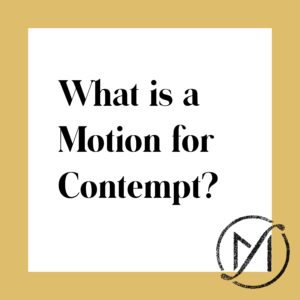One of the questions many people have is “What is a Motion for Contempt?” When the court finalized your divorce, it issued a divorce decree. That divorce decree is a final, enforceable court order. The majority of people do what the court order requires (especially when they reached an out of court agreement that became the court’s order).
But what happens when a spouse doesn’t follow the court’s order? Sometimes a spouse fails to divide marital property or to pay child support or alimony. In other cases, they don’t follow the parenting plan or won’t cover or pay for children’s expenses.
When that happens, the other spouse can file a Motion for Contempt asking the court to find them in contempt of court.
When Will a Court Hold Someone in Contempt?
You need to file a Motion for Contempt seeking that the court rule that your spouse was in contempt (and order your ex to follow the court order). Generally speaking, the court doesn’t patrol when people are following its orders, which means you affirmatively need to bring the problem to the court’s attention. To accomplish this, we file a Motion for Contempt.
A Motion for Contempt requires the requesting spouse to meet a specific burden of proof.
In order for the judge to find of contempt, you will need to show by clear and convincing evidence that there:
- is a clear and unambiguous court order,
- your spouse violated that order,
- the party who violated the order acted willfully.
Finally, you must clearly explain the relief you are seeking from the court.
Freed Marcroft’s attorneys practice family law exclusively and have in-depth experience representing people with contempt motions.
When Can You File a Motion for Contempt?
Pendente Lite Motion for Contempt
During your divorce you may have heard the term “pendente lite.” Pendente lite applies to court orders which are in effect while a divorce is pending. An example of pendente lite orders are the automatic orders that go into effect when every divorce is initiated. There may also be pendente lite court orders putting child support or alimony in place while your divorce is ongoing.
When one spouse doesn’t follow pendente lite orders during the divorce, the other spouse can file a Motion for Contempt.
Post Judgment Motion for Contempt
Any litigation that occurs after the date a divorce is final is referred to as “Post Judgment.” Therefore, a Motion for Contempt filed after the court orders its final divorce decree is a Post Judgment contempt. Another example of a Post Judgment motion is a Motion to Open a Judgment.
What if My Ex Files a Motion for Contempt Against Me?
Even if you didn’t follow the court order, but you didn’t willfully violate it, the court may not find you in contempt. There are significant nuances to successfully defending a contempt motion on the basis that you did not intend to violate the order, so it’s critical to work with a family law attorney with deep experience in Post Judgment litigation.
What Happens When Someone is Found in Contempt?
The main goal of a Motion to Contempt is often to get someone to comply and with the court’s orders — and keep complying with them in the future. In addition, the court can force someone found in contempt to pay some or all of the other party’s legal fees related to the Motion for Contempt. The court is also authorized to put someone in jail for contempt of its orders.
What are Other Post Judgment Motions?
The Motion for Modification and the Motion for Contempt are probably the most common motions filed post-divorce in Connecticut. Another frequent Post Judgment motion is the Motion to Open the Judgment.
Next Steps
Knowing which Post Judgment motions to file in what circumstances requires a depth of knowledge and experience about Connecticut family law and with the Connecticut courts. Depending on your circumstances, filing a Motion for Contempt isn’t always a necessary or even preferable first course of action. It may be counterintuitive, but sometimes even when there is a contempt, we are able to reach an agreement rather than litigate. Mediation and collaborative law are options to consider. In those cases, we submit the agreement you reach to the court so that it becomes an enforceable court order.
There are other creative solutions that may meet your needs and help you move forward without issues. Freed Marcroft’s family law attorneys can explain the ins and outs and put together a legal strategy for you, rooted in your goals.
Schedule your Goals & Planning Conference today, or contact us here.









